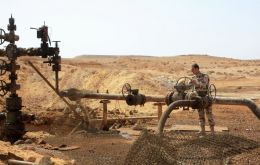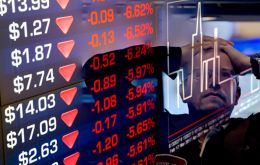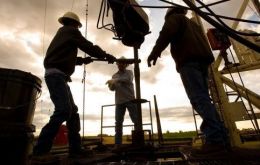MercoPress. South Atlantic News Agency
Tag: oil price
-
Monday, March 5th 2018 - 09:19 UTC
YPF recovers from 2016 and posts full year profit of US$ 627m for 2017

Argentina’s state-owned oil company YPF SA posted a full-year 2017 profit of 12.7 billion pesos (US$ 627.16 million), the company said, rebounding from a 28.4 billion-peso loss in 2016.
-
Sunday, March 4th 2018 - 15:58 UTC
Oil Market Fears: War, Default And Nuclear Weapons

The U.S. is one of the few areas of the world in which there is an energy investment boom underway, a development that could smooth out the uncertainties of geopolitical events around the world. At the same time, outside of the U.S., there is a deterioration of stability in many oil-producing regions, aggravating risks for both oil companies and the oil market, according to a new report.
-
Sunday, February 25th 2018 - 13:48 UTC
Why The Next Oil Boom Will Be Fueled By Blockchain

Big Oil is due for a disruption.
-
Wednesday, February 21st 2018 - 01:26 UTC
Petro, the Venezuelan cryptocurrency is online

The pre-sale of Petro began early on Tuesday, the cryptocurrency proposed by the Venezuelan government in recent weeks and backed by the country's natural resources. According to experts, it is “ridiculous”, arguing that the creation of a new currency would aggravate the economic crisis in the Caribbean country.
-
Wednesday, February 14th 2018 - 16:28 UTC
Clean Oil That Only Costs $20

The United States is in the midst of an energy revolution.
Oil production has risen by 5 million barrels per day (bpd) since 2010, an increase of nearly 100 percent. New technology, particularly techniques in shale oil drilling, has opened up vast new opportunities for oil and gas companies. -
Wednesday, February 7th 2018 - 14:41 UTC
Oil Prices Ravaged By Financial Turmoil

By Nick Cunningham of Oilprice.com
Oil prices fell back suddenly over the last few trading sessions, dragged down by some forces beyond the oil market. -
Wednesday, January 17th 2018 - 09:32 UTC
Hard times in Cuba: electricity and fuel cuts, slashed imports and payments to suppliers delayed

Cuba has not provided a detailed breakdown of key economic activity in its annual statistical abstract for the first time this century, leaving would-be investors more in the dark than usual about the cenrtralized-run economy.
-
Wednesday, November 8th 2017 - 10:50 UTC
Oil markets settle lower, but prospects are in place for prices to continue climbing

Oil settled lower on Tuesday after rising to the highest since July 2015 the previous day, while tension flared between Saudi Arabia and Iran, and the Saudi crown prince tightened his grip on power.
-
Monday, July 10th 2017 - 17:45 UTC
Don't hold your breath for deeper OPEC cuts

The rally in oil prices over the past two weeks came to a halt on news that OPEC is actually exporting more oil than previously thought. A month ago, oil prices appeared to be higher than they should have been, with weak demand, elevated inventories, and a recognition that the nine-month OPEC extension would be inadequate to balance the market.
-
Thursday, May 25th 2017 - 19:07 UTC
Today's stunted oil prices could cause oil price shock in 2020

As oil prices remain unsteady and OPEC continues to make headlines every hour, the world is focused on oil's immediate future. As Saudi Arabia announces plans to slash production and move their economy away from oil dependency, many industry insiders are predicting that the now over-saturated market will reach an equilibrium with higher commodity prices by 2018 and U.S. shale production will continue to grow along with global demand.
